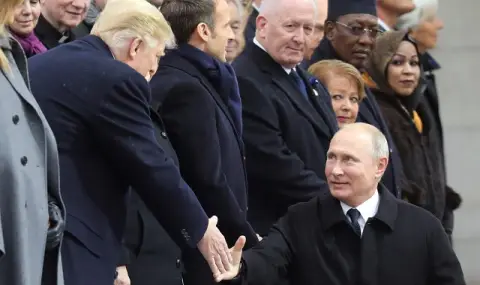2025 is expected to be a turning point in the war in Ukraine, which will enter its fourth year. Europe cannot afford to miss the expected peace talks, writes Eric Scholl in an article for the French newspaper L"Express.
On February 4, 1945, Stalin, Roosevelt and Churchill met on the Black Sea coast of Crimea to lay the foundations for peace. The Yalta Conference would lead to the division of the world - and Europe in particular - between the three future great victors of World War II. Eighty years later, will we see Donald Trump and Vladimir Putin sitting at the negotiating table to end this war in Ukraine, which is about to enter its fourth year? The future American president promised: he would resolve the conflict in less than twenty-four hours. But like Roosevelt in 1945, he will need Moscow's cooperation if he wants to achieve his goals.
We remember the illusory "demanding dialogue" that Emmanuel Macron had with his Kremlin host a few days before the Russian invasion of Ukraine: can you really have a discussion with Vladimir Putin, a dictator who sends his soldiers through a meat grinder to try to swallow a few extra square kilometers so that he can appear in a position of strength when the time comes to negotiate?
For now, the Ukrainians continue to show the rest of the world their heroic courage. "We are fighting because this is our home", sums up Marina Kumeda, author of "The Diary of a Ukrainian Woman" (Editions de l"Aube, 2023). In their offices, diplomats are developing scenarios, convinced of several things. First, 2025 will indeed represent a turning point in this war. However unpredictable it may be, Donald Trump will undoubtedly help resolve the situation. Anyone who already dreams of the Nobel Peace Prize certainly has the ambition. "This represents a difficulty, but also many opportunities in the eyes of Ukrainians", assesses Anna-Colin Lebedev, professor of political science at the University of Paris-Nanterre.
But what kind of peace are we talking about? Because - and this is the second conviction - Ukraine will have to accept territorial losses. Provided that solid guarantees are obtained for both the country's sovereignty and its physical security. But who will provide these guarantees when American aid to Kiev is currently suspended?
"2025 will bring everyone to their senses, analyzed Camille Grand, a researcher at the European Council on Foreign Relations and a former deputy secretary general of NATO. Europe will have to show that it can shoulder a greater share of the burden.
"The time has come for a European awakening, so that we do not leave Donald Trump and Vladimir Putin to negotiate a way out of the Ukrainian conflict alone. Because we cannot imagine a just world without Ukraine and Europe. It is crucial to avoid a repeat of the Yalta fool's game, which led Churchill to say, just a year after the Crimean conference: "We will not overcome the difficulties and the dangers by hiding our faces. We will not make them disappear by simply waiting to see what happens [...] We need an agreement, and the longer we delay reaching it, the harder it will be to find it and the greater the dangers that threaten us.
In 2025, these dangers have never threatened Europe so much since the post-war period."
